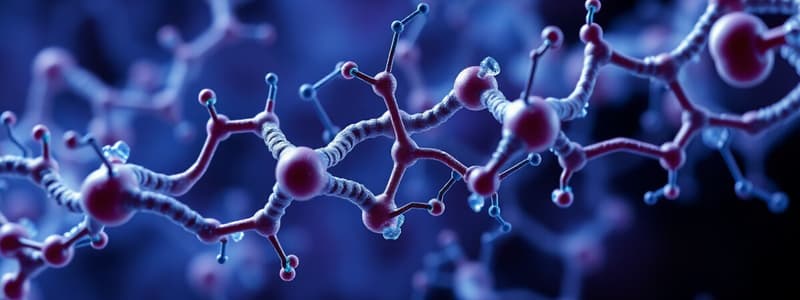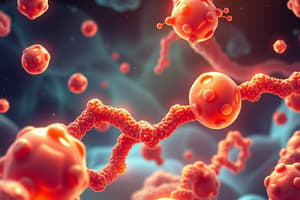Podcast
Questions and Answers
How many ATP molecules are required to create six activated isoprenes for squalene synthesis?
How many ATP molecules are required to create six activated isoprenes for squalene synthesis?
- 18 ATP (correct)
- 21 ATP
- 12 ATP
- 15 ATP
What intermediate is formed when two isoprenes join together during the synthesis of squalene?
What intermediate is formed when two isoprenes join together during the synthesis of squalene?
- Farnesyl pyrophosphate
- Isopentenyl pyrophosphate
- Geranyl pyrophosphate (correct)
- Squalene 2,3-epoxide
What is the final product of cyclization after squalene is converted?
What is the final product of cyclization after squalene is converted?
- Vitamin D
- Testosterone
- Lanosterol (correct)
- Cholesterol
What is the role of HMG-CoA reductase in cholesterol synthesis?
What is the role of HMG-CoA reductase in cholesterol synthesis?
What makes cholesteryl esters more nonpolar compared to cholesterol?
What makes cholesteryl esters more nonpolar compared to cholesterol?
What effect does AMP have on AMPK?
What effect does AMP have on AMPK?
Which hormone cascade leads to the dephosphorylation and increased activity of HMG-CoA?
Which hormone cascade leads to the dephosphorylation and increased activity of HMG-CoA?
What is the structure of cholesterol characterized by?
What is the structure of cholesterol characterized by?
What is the primary mechanism by which statin drugs lower cholesterol levels?
What is the primary mechanism by which statin drugs lower cholesterol levels?
Which of the following is a precursor molecule in cholesterol synthesis?
Which of the following is a precursor molecule in cholesterol synthesis?
Which of the following steroid hormones is synthesized in the adrenal gland?
Which of the following steroid hormones is synthesized in the adrenal gland?
What is the rate-limiting step in cholesterol synthesis?
What is the rate-limiting step in cholesterol synthesis?
What is the primary site for the conversion of cholesterol to steroid hormones?
What is the primary site for the conversion of cholesterol to steroid hormones?
What is a known side effect of statin drugs?
What is a known side effect of statin drugs?
Which enzymes catalyze the condensation of Acetyl-CoA to HMG-CoA?
Which enzymes catalyze the condensation of Acetyl-CoA to HMG-CoA?
What happens during the conversion of cholesterol to pregnenolone in steroid hormone synthesis?
What happens during the conversion of cholesterol to pregnenolone in steroid hormone synthesis?
What molecule is produced from the conversion of mevalonate?
What molecule is produced from the conversion of mevalonate?
What type of compound are cholesteryl esters considered in terms of solubility?
What type of compound are cholesteryl esters considered in terms of solubility?
What role do Cytochrome P450 enzymes play in steroidogenesis?
What role do Cytochrome P450 enzymes play in steroidogenesis?
Which statement correctly describes the function of Cyt P450 in cholesterol biosynthesis?
Which statement correctly describes the function of Cyt P450 in cholesterol biosynthesis?
What is the final product of the cholesterol synthesis pathway after squalene cyclizes?
What is the final product of the cholesterol synthesis pathway after squalene cyclizes?
Flashcards
Cholesterol Biosynthesis Phases
Cholesterol Biosynthesis Phases
A four-step process starting with acetyl-CoA, culminating in cholesterol formation.
Mevalonate Formation
Mevalonate Formation
Two acetyl-CoAs combine to form mevalonate, a crucial intermediate in cholesterol synthesis.
HMG-CoA Reductase
HMG-CoA Reductase
Enzyme that catalyzes the conversion of HMG-CoA to mevalonate. A key regulatory enzyme in cholesterol synthesis.
Isoprene Formation
Isoprene Formation
Signup and view all the flashcards
Squalene Formation
Squalene Formation
Signup and view all the flashcards
Cholesterol Cyclization
Cholesterol Cyclization
Signup and view all the flashcards
Cholesterol Properties
Cholesterol Properties
Signup and view all the flashcards
Cholesterol Derivatives
Cholesterol Derivatives
Signup and view all the flashcards
Squalene to Cholesterol
Squalene to Cholesterol
Signup and view all the flashcards
Cholesterol Transport
Cholesterol Transport
Signup and view all the flashcards
Cholesterol Esterification
Cholesterol Esterification
Signup and view all the flashcards
Cholesterol Uses
Cholesterol Uses
Signup and view all the flashcards
AMP-dependent protein kinase (AMPK)
AMP-dependent protein kinase (AMPK)
Signup and view all the flashcards
Glucagon and Epinephrine
Glucagon and Epinephrine
Signup and view all the flashcards
Insulin
Insulin
Signup and view all the flashcards
Statin drugs
Statin drugs
Signup and view all the flashcards
Oxysterol
Oxysterol
Signup and view all the flashcards
Steroid hormones
Steroid hormones
Signup and view all the flashcards
Steroid hormone synthesis
Steroid hormone synthesis
Signup and view all the flashcards
Study Notes
Cholesterol and Steroids Lecture 36
- King Saud bin Abdulaziz University for Health Sciences, 2005
- Lecture focuses on cholesterol and steroid biosynthesis, regulation, and their derivatives.
Learning Outcomes
- Students should be able to explain the phases of cholesterol biosynthesis
- Understand the regulation of cholesterol synthesis
- Describe the biosynthesis of steroids and bile acids
- Explain the function and activity of Cyt P450
- List the main cholesterol derivatives
Cholesterol Structure & Properties
- 27 carbon atoms
- Four fused rings
- Peripheral side chain
- Only one double bond (C=C)
- Low solubility in water (only 30% in free form)
- Cholesterol is esterified to long chain fatty acids (cholesteryl esters), even less soluble
- Essential for all animal life, precursor to steroid hormones, bile salts, and Vitamin D
Four Stages of Cholesterol Synthesis
- Three acetate condense to form mevalonate
- Mevalonate converts to phosphorylated 5-carbon isoprene
- Six isoprenes polymerize to form 30-carbon linear squalene
- Squalene cyclizes to form four rings, which are modified to produce cholesterol
Step 1: Formation of Mevalonate from Acetyl-CoA
- 2 Acetyl-CoAs → Acetyoacetyl-CoA (catalyzed by acetyl-CoA acyl transferase)
- Acetyl-CoA + Acetoacetyl-CoA → β-hydroxy-β-methylglutaryl-CoA (HMG-CoA) (catalyzed by HMG-CoA synthase)
- HMG-CoA + 2 NADPH → mevalonate (catalyzed by HMG-CoA reductase), rate-limiting step
Step 2: Conversion of Mevalonate to Two Activated Isoprenes
- 3 phosphate groups transferred stepwise from ATP to mevalonate
- Decarboxylation and hydrolysis produce a diphosphorylated 5-C product (isoprene)
- Isomerization to a second isoprene
- Two "activated" isoprene units are Δ3-isopentyl pyrophosphate and dimethylallyl pyrophosphate
- Only reaction using ATP. Three ATPs create each of the six activated isoprenes construct squalene. This costs 18 ATP
Step 3: Six Activated Isoprene Units Condense to Form Squalene
- Two isoprenes join head-to-tail, one set of diphosphates
- Forms geranyl pyrophosphate
- Geranyl joins to another isopentenyl pyrophosphate
- Forms 15-C farnesyl pyrophosphate
- Two farnesyl pyrophosphates join head-to-head to form phosphate-free squalene
Step 4: Conversion of Squalene to Four-Ring Steroid Nucleus
- Squalene monooxygenase adds one oxygen to the end of the squalene chain
- Forms squalene 2,3-epoxide
- Cyclization product in animals is lanosterol, which converts to cholesterol
Fates of Cholesterol After Synthesis
- In vertebrates, most cholesterol synthesized in the liver, then exported as bile acids, biliary cholesterol, or cholesteryl esters
- Some cholesterol used in liver for membrane synthesis
- Other tissues use cholesterol as precursor for steroid hormones and Vitamin D
- Cholesteryl esters are more nonpolar than cholesterol containing a fatty acid esterified to the oxygen.
HMG-CoA Reductase is Most Active When Dephosphorylated
- Covalent modification provides short-term regulation
- AMP-dependent protein kinase (AMP activates AMPK, AMPK phosphorylates and inhibits HMG CoA)
- Glucagon, epinephrine (cascades lead to HMG CoA phosphorylation, reducing activity)
- Insulin (cascades lead to dephosphorylation, increasing activity)
Statin Drugs Inhibit HMG-CoA Reductase to Lower Cholesterol
- Statins resemble mevalonate, competitive inhibitors of HMG-CoA reductase
- Lowers serum cholesterol by tens of percent
- Side effects: muscle weakness, coenzyme Q depletion
- Reported to improve circulation, stabilize plaques, removing cholesterol, reducing inflammation
Regulation of Cholesterol Metabolism
- Oxysterol is a cholesterol metabolite
There Are Several Classes of Cholesterol-Derived Steroids
- Adrenal gland synthesized steroids: mineralocorticoids, glucocorticoids
- Gonad-synthesized steroids (testes and ovaries): progesterone, testosterone, estrogens
- Affects protein and carbohydrate metabolism, suppressing immune response/inflammation/allergic responses.
- Aldosterone regulates Na+, Cl-, and HCO3 reabsorption in the kidney
Steroid Hormones Synthesis
- Steroid hormone synthesis occurs in mitochondria of steroidogenic tissues: placenta, ovaries, testes, adrenal cortex.
How Steroids Are Made From Cholesterol
- Takes place in mitochondria
- Converts cholesterol to pregnenolone
- Two carbons are hydroxylated by mixed-function oxidase (NADPH and cytochrome P450) on side chain at C-17 of D ring
- "Side chain" is cleaved by desmolase
- Hydroxylation makes steroids more water-soluble, easier transport in blood and excretion
Cytochrome P450s
- Found associated with inner mitochondrial and microsomal membranes
- In steroidogenic tissues (placenta, ovaries, testes, adrenal cortex): P450 used to hydroxylate intermediates during cholesterol to steroid hormone conversion
- In liver: P450 used for:
- Cholesterol to bile acid conversion
- Hydroxylation of cholecalciferol to 25-hydroxycholecalciferol (vitamin D3)
- Activation or inactivation of foreign compounds/drugs, changing their toxicity/solubility
- Hydroxylation of vitamin D3 to active form 1,25-dihydroxyvitamin D3
Activated Isoprenes Have Many Alternative Fates
- Isopentenyl pyrophosphate activated precursor in biosynthesis of many biomolecules (cholesterol, vitamins A, E, K.)
- Prenylation: anchoring proteins to inner membrane by covalent attachment to isoprenoid
Studying That Suits You
Use AI to generate personalized quizzes and flashcards to suit your learning preferences.
Related Documents
Description
This quiz covers the biosynthesis and regulation of cholesterol and steroid hormones, focusing on the processes outlined in Lecture 36 from King Saud bin Abdulaziz University for Health Sciences. Students will learn about the phases of cholesterol synthesis, the role of Cyt P450, and the significance of cholesterol derivatives. Develop a deeper understanding of the structure and properties of cholesterol essential for animal life.




